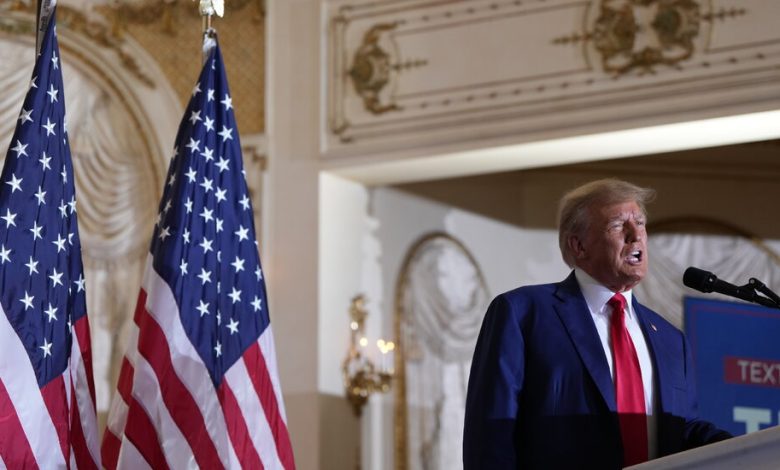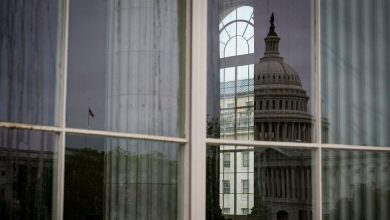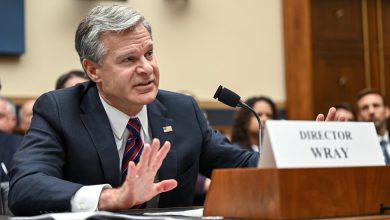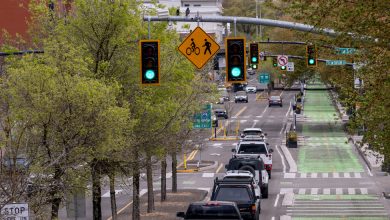Witnesses Asked About Trump’s Handling of Map With Classified Information

Federal investigators are asking witnesses whether former President Donald J. Trump showed off to aides and visitors a map he took with him when he left office that contains sensitive intelligence information, four people with knowledge of the matter said.
The map has been just one focus of the broad Justice Department investigation into Mr. Trump’s handling of classified documents after he departed the White House.
The nature of the map and the information it contained is not clear. But investigators have questioned a number of witnesses about it, according to the people with knowledge of the matter, as the special counsel overseeing the Justice Department’s Trump-focused inquiries, Jack Smith, examines the former president’s handling of classified material after leaving office and weighs charges that could include obstruction of justice.
One person briefed on the matter said investigators have asked about Mr. Trump showing the map while aboard a plane. Another said that, based on the questions they were asking, investigators appeared to believe that Mr. Trump showed the map to at least one adviser after leaving office.
A third person with knowledge of the investigation said the map might also have been shown to a journalist writing a book. The Washington Post has previously reported that investigators have asked about Mr. Trump showing classified material, including maps, to political donors.
The question of whether Mr. Trump was displaying sensitive material in his possession after he lost the presidency and left office is crucial as investigators try to reconstruct what Mr. Trump was doing with boxes of documents that went with him to his Florida residence and private club, Mar-a-Lago.
Among the topics investigators have been focused on is precisely when Mr. Trump was at the club last year. In particular, they were interested in whether he remained at Mar-a-Lago to look at boxes of material that were still stored there before Justice Department counterintelligence officials seeking their return came to visit in early June, according to two people familiar with the questions.
Understand the Trump Documents Inquiry
The Justice Department is conducting a criminal investigation into Donald Trump’s handling of classified files after he left office.
- Special Counsel: Attorney General Merrick Garland appointed Jack Smith, a longtime prosecutor, to take over the inquiry. Here is what Smith’s role entails.
- A Behind-the-Scenes Battle: A legal fight over obtaining evidence from a lawyer who represented Trump in the inquiry has brought into sharper view where the Justice Department might be headed with the case.
- Comparison With Biden Case: The discovery of classified documents from President Biden’s time as vice president prompted comparisons to Trump’s hoarding of records. But there are key differences.
Mr. Trump typically leaves Florida for his club in Bedminster, N.J., earlier than he did last year, when he was still at Mar-a-Lago for the visit from the Justice Department officials, on June 3. Investigators have been gathering evidence about whether Mr. Trump had aides bring him boxes to sift through after a grand jury subpoena was issued in May for any government documents Mr. Trump still had in his possession, the people said.
After the June 3 visit, when Justice Department officials were handed a batch of documents with classified markings that had been found at Mar-a-Lago, a lawyer for Mr. Trump signed a certification saying a “diligent search” had been conducted and all government material had been returned. That statement proved untrue two months later when the F.B.I. found hundreds of pages of additional classified documents during a court-authorized search.
Investigators have also asked questions about whether Gen. Mark A. Milley, the chairman of the Joint Chiefs of Staff, was ever mentioned in discussions related to the boxes of material, as well as whether donors to Mr. Trump were ever part of discussions about the material, according to people familiar with the questions.
Christopher M. Kise, a lawyer working with Mr. Trump on some of his cases, faulted the Justice Department for its focus on the former president’s handling of classified material, like documents related to his dealings with the North Korean leader Kim Jong-un. Mr. Kise suggested that the department should be focused on the recent leaks of intelligence under the Biden administration about the war in Ukraine.
“Seems the priorities are misplaced here,” he said. “America’s national security apparatus is spending much time and taxpayer money alleging President Trump had old photos of K.J.U. and some outdated map while real wartime intelligence data is flying out the door. Might be time to focus on what matters.”
The documents investigation being overseen by Mr. Smith, the special counsel, is running in parallel with another he is managing that is focused on Mr. Trump’s efforts to remain in power after his election loss in 2020 and how those efforts led to the Jan. 6, 2021, assault on the Capitol.
As part of the documents investigation, federal prosecutors have been building a potential case that Mr. Trump obstructed justice by seeking to avoid returning all the classified material in his possession after leaving office.
Investigators have compiled extensive witness testimony, texts and emails from a number of key witnesses. They have constructed a timeline of Mr. Trump’s actions and movements and interviewed dozens of people, including close advisers to Mr. Trump as well as staff members at Mar-a-Lago and former administration officials who had knowledge of how he handled documents in different settings.
They have heard from witnesses who described Mr. Trump being urged repeatedly in 2021 by aides and advisers to return material to the National Archives, and then how he handled the grand jury investigation by the Justice Department that began early last year and resulted in a subpoena for any remaining classified material in Mr. Trump’s possession.
Among the witnesses interviewed was a Mar-a-Lago employee who moved boxes with a close aide to Mr. Trump, Walt Nauta, according to people familiar with the events.
It remains less clear whether prosecutors are building a case for other potential charges beyond obstruction. In seeking the search warrant used last summer at Mar-a-Lago, prosecutors cited potential violations of the Espionage Act, which relates to mishandling of national defense information, and the removal or destruction of records, in addition to obstruction.
Prosecutors have now interviewed nearly everyone who could offer insight in connection with the documents, according to one person briefed on the range of witnesses.
Among those interviewed recently is one of the lawyers involved in Mr. Trump’s response to the grand jury subpoena for remaining documents. Prosecutors successfully asked the chief judge who had been presiding over the grand jury until recently, Judge Beryl A. Howell, to allow them to question the lawyer, M. Evan Corcoran.
Judge Howell ruled that Mr. Corcoran had to testify to the grand jury in the case and could not invoke attorney-client privilege on certain topics. Judge Howell cited what is known as a crime-fraud exception to attorney-client privilege.
Her order ruling that Mr. Corcoran must testify was said to be accompanied by an 86-page memorandum of law. She found that the Justice Department had met the threshold for having a credible case that Mr. Trump had obstructed justice, justifying its request to override attorney-client privilege and require Mr. Corcoran’s testimony about his role, according to people familiar with the memorandum’s contents.
Judge Howell wrote not only about Mr. Trump’s actions in relation to the subpoena last year, but also wrote that what she called “misdirection” with the National Archives in 2021 and early last year was “apparently a dress rehearsal” for how he handled the subpoena in May, according to a person briefed on its contents.
“The court certainly appears to have allowed the government to invade the attorney-client privilege based on minimal proof,” Mr. Kise said.
In a recent interview with Newsmax, Mr. Trump complained that Mr. Corcoran was being compelled to testify, saying he had always believed an attorney “can’t be subpoenaed.”
“If they testify truthfully, they’ll see I did nothing wrong,” Mr. Trump said.
This week, top congressional leaders and the senior Democrats and Republicans on the intelligence committees in both chambers of Congress gained access to classified documents recovered from Mr. Trump, as well as a smaller number discovered in recent months to be in the possession of President Biden from years earlier, and some recovered from former Vice President Mike Pence.



